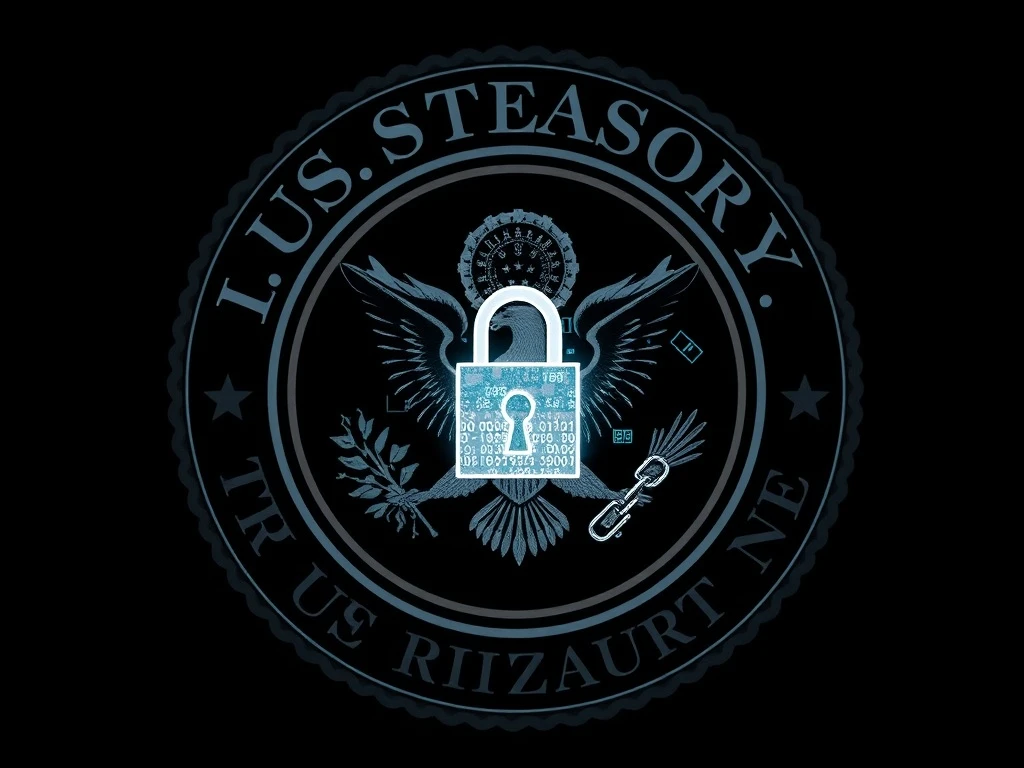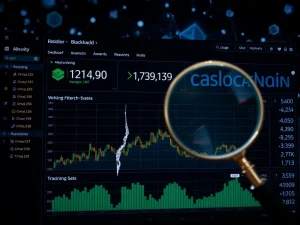Urgent: OFAC Unleashes Second Wave of Sanctions Against Garantex Crypto Exchange

The cryptocurrency world recently saw a significant development as the US Treasury’s Office of Foreign Assets Control (OFAC) took decisive action. In a powerful move, OFAC redesignated the crypto exchange Garantex Europe to its list of sanctioned entities for a second time. This action underscores the United States’ firm stance against financial crimes within the digital asset space. It sends a clear message to all virtual asset service providers: compliance is not optional. The implications of these OFAC sanctions extend beyond Garantex, impacting the broader perception of regulatory oversight in the crypto industry.
OFAC Sanctions: A Renewed Crackdown on Illicit Crypto Activities
On Thursday, the US Treasury’s Office of Foreign Assets Control (OFAC) announced additional measures against Garantex Europe. This marks the second time the entity has faced such penalties. The agency revealed it also sanctioned Garantex’s alleged “successor,” Grinex. Furthermore, the action targeted three Garantex executives and six companies based in Russia and the Kyrgyz Republic. These entities allegedly facilitated a wide range of illicit transactions. OFAC’s determination to pursue these networks highlights the ongoing efforts to clean up the digital financial ecosystem.
According to the government agency, the Garantex exchange has processed over $100 million linked to illicit activities since 2019. These activities include ransomware attacks and darknet market transactions. John Hurley, Under Secretary of the Treasury for Terrorism and Financial Intelligence, emphasized the gravity of these abuses. He stated, “Digital assets play a crucial role in global innovation and economic development. However, the United States will not tolerate abuse of this industry to support cybercrime and sanctions evasion.” Exploiting crypto exchange platforms for money laundering and ransomware attacks directly threatens national security. Moreover, it damages the reputation of legitimate virtual asset service providers.
Garantex’s History of Non-Compliance and Money Laundering
OFAC initially sanctioned Garantex in 2022. At that time, the agency cited the exchange’s “willful disregard” for Anti-Money Laundering (AML) and Combating the Financing of Terrorism (CFT) requirements. This initial action aimed to disrupt Garantex’s operations. Authorities confiscated $26 million in crypto assets. They also seized the exchange’s website and indicted two executives. Despite these measures, Garantex officers reportedly created Grinex. This new entity aimed to bypass the previous sanctions. Such tactics demonstrate the persistent challenge regulators face in curbing financial illicit activities in the crypto space. The continuous cat-and-mouse game between regulators and bad actors remains a significant hurdle for the industry’s maturation.
The latest sanctions included several wallet addresses. These addresses were associated with Bitcoin (BTC), Ether (ETH), and Tron (TRX). This move aims to further restrict the flow of funds for these illicit operations. It also signals OFAC’s increasing sophistication in tracking digital assets. The ability to identify and freeze specific crypto wallets is a powerful tool in combating financial crime. It shows a growing understanding of blockchain forensics by government agencies.
The Broader Impact of Illicit Transactions on the Crypto Ecosystem
The crackdown on Garantex serves as a stark reminder of the persistent problem of illicit transactions within the cryptocurrency sector. While digital assets offer immense potential for innovation and financial inclusion, their pseudonymous nature can attract criminal elements. These bad actors exploit vulnerabilities in exchanges and decentralized protocols to move funds obtained through ransomware, scams, and other illegal activities. The US Treasury’s actions are part of a wider global effort to mitigate these risks. They seek to ensure that the promise of blockchain technology is not overshadowed by its misuse. Legitimate businesses and users suffer when a crypto exchange is used for nefarious purposes. This can lead to increased skepticism and stricter regulations for everyone.
The fight against money laundering through crypto is a complex one. It requires international cooperation and advanced technological capabilities. Law enforcement agencies are continually developing new tools and strategies to trace funds across various blockchains. They are also working to dismantle the networks that facilitate these crimes. The case of Garantex highlights several key challenges:
- The ease with which new entities can be formed to circumvent sanctions.
- The global nature of crypto crime, requiring cross-border collaboration.
- The need for robust AML/KYC (Know Your Customer) policies at all virtual asset service providers.
Legal Ramifications and Executive Arrests
The US Department of Justice has pursued legal action against key Garantex executives. In March, they unsealed indictments against Aleksandr Mira Serda and Aleksej Besciokov. This led to the arrest of Besciokov while he was on holiday in India. He now faces serious charges. These include conspiracy to commit money laundering, conspiracy to violate US sanctions, and conspiracy to operate an unlicensed money services business. This arrest demonstrates the long reach of US law enforcement. It also shows their commitment to holding individuals accountable for their involvement in illicit crypto activities, regardless of their physical location.
The pursuit of justice continues. On August 6, the US District Court for the Eastern District of Virginia ordered a “corrected” warrant for Mira Serda’s arrest. He remained at large at the time of publication. US authorities have offered substantial rewards for information leading to his arrest. Up to $6 million is available for information on Mira Serda or other Garantex executives. These rewards underscore the importance of dismantling these criminal networks. They also encourage public assistance in locating high-profile fugitives. Such incentives are crucial in complex international investigations.
Strengthening Crypto Regulation and Compliance
The ongoing actions against Garantex underscore the evolving landscape of crypto regulation. Governments worldwide are intensifying their efforts to bring digital assets under stricter oversight. This includes implementing comprehensive frameworks for AML, CFT, and sanctions compliance. For any legitimate crypto exchange, adhering to these regulations is paramount. Failure to do so can result in severe penalties, reputational damage, and even operational shutdowns. The US Treasury’s proactive approach serves as a cautionary tale for any platform considering a lax approach to compliance.
The focus on sanctions evasion and money laundering reflects a broader trend. Regulators aim to integrate the digital asset industry into the existing financial system. This integration requires adherence to the same standards applied to traditional financial institutions. This ensures that cryptocurrencies are not exploited as safe havens for criminal funds. The long-term health and legitimacy of the crypto industry depend on its ability to demonstrate robust compliance mechanisms. Responsible innovation must go hand-in-hand with effective risk management. The industry must actively work to identify and mitigate risks associated with illicit finance.
The Future of Digital Asset Security and Enforcement
The case of Garantex highlights the increasing sophistication of both cybercriminals and law enforcement. As technology advances, so do the methods used for both illicit activities and their detection. The US Treasury’s continued vigilance against entities like Garantex signals a persistent commitment to securing the financial system. This includes the rapidly expanding digital asset sector. The actions against Garantex and Grinex are not isolated incidents. They are part of a larger strategy to combat financial crime globally. This strategy leverages intelligence, sanctions, and law enforcement cooperation.
Ultimately, these regulatory actions aim to foster a safer and more transparent environment for digital assets. By deterring and punishing those who engage in illicit transactions, authorities seek to build trust in the crypto space. This trust is essential for mainstream adoption and sustained growth. Legitimate businesses and users benefit from a regulatory environment that effectively combats financial crime. The ongoing efforts by OFAC and other agencies will continue to shape the future of crypto. They will drive a necessary evolution towards greater accountability and compliance within the industry.









